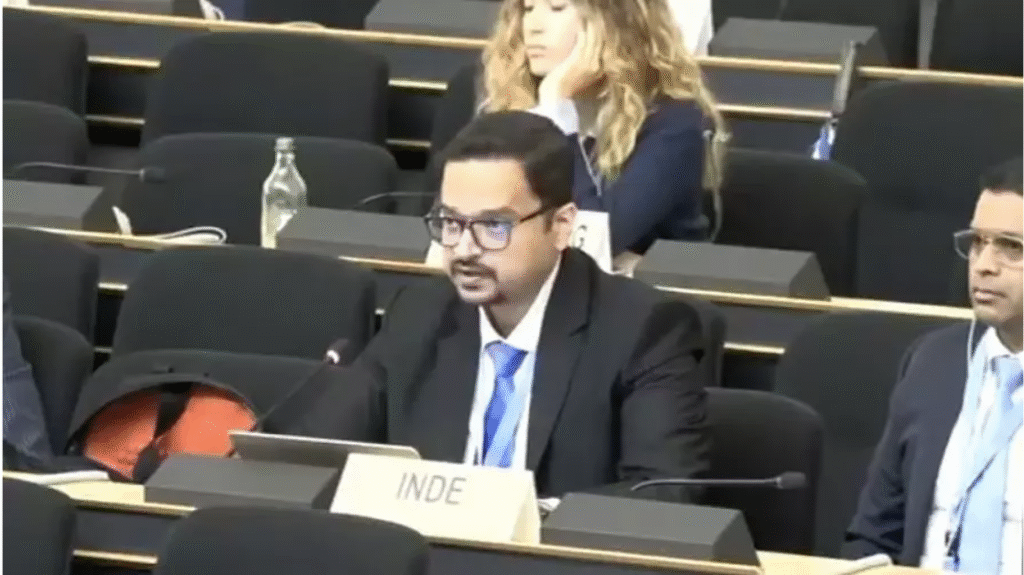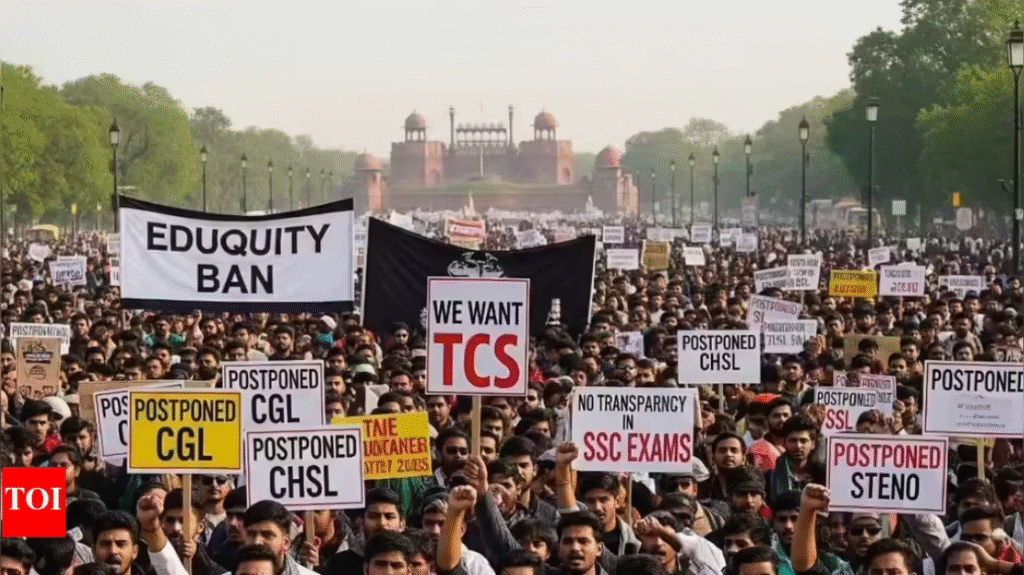During the 60th Session of the United Nations Human Rights Council (UNHRC) in Geneva, Switzerland—currently presiding over the council—called on India to protect minorities and uphold freedoms of expression and media. The Swiss delegate’s remarks triggered a strong diplomatic response from Indian Counsellor Kshitij Tyagi.
Tyagi described Switzerland’s remarks as “surprising, shallow, and ill-informed,” urging the European country to address its own domestic issues—specifically racism, systematic discrimination, and xenophobia. Moreover, Tyagi emphasized India’s diverse democracy and offered help to Switzerland for tackling those issues if required.
What Switzerland Had Asked
The Swiss delegate, speaking at the General Debate during the oral update by the UN High Commissioner for Human Rights, had urged India to take effective measures for the protection of minorities, and stressed that media freedom and expression must be safeguarded. They called upon India to uphold international human rights norms in these areas.
Switzerland’s position aligns with concern by many global human rights organisations that minority protections in India, including religious minorities, may require stronger enforceable legal mechanisms. Such calls often include preserving the neutrality of media, ensuring due process for complaints, and preventing discrimination. (Background from multiple reports.)
India’s Rebuttal: Legal and Diplomatic Angles
Sovereignty & Domestic Legal Systems
Tyagi’s response highlighted India’s argument that each nation has its own legal framework to address human rights, and external criticism should be based on fact, not generalization. India underlined constitutional guarantees—right to equality, freedom of religion, speech, and protection for minorities under law.
Legal Obligations under International Law
India is party to key international conventions that protect minority rights and media freedom. But Tyagi’s counterpoint was that these obligations also apply to Switzerland, especially given its presidency of the Human Rights Council. Thus, he argued Switzerland should not lose sight of its own commitments. This raises legal‐diplomatic issues of reciprocity and enforceability of international human rights norms.
Balancing Freedom of Expression & State Rights
While Switzerland urged India to protect freedom of expression and media, India’s retort places emphasis on “unfounded narratives.” The conflict highlights a common tension in international human rights law: when criticism by one state is seen as interference by another. Legal scholars often debate how far states should be held accountable for media in private domain, or for speech that occurs inside a country’s borders.
Reactions, Social Media & Wider Implications
The rebuttal by Tyagi won considerable praise among Indian netizens. Many saw this diplomatic pushback as symbolic of a more assertive India on global issues. Some media commentaries frame this as part of a larger shift in India’s foreign policy: speaking back to criticism, not simply defending internal actions.
However, critics say that despite the rhetoric, India may need more transparent legal action on minority rights, media freedom, and protection from discrimination to substantiate its claims. International human rights organisations will likely monitor this closely.
Legal Context: Indian Law & International Expectations
- Indian Constitutional Law: India’s Constitution protects freedom of speech (Article 19), equality before law (Article 14), and prohibits discrimination based on religion, race, etc. These form India’s legal foundation to respond to such external critiques.
- International Treaties & Conventions: India has ratified several UN treaties, including the International Covenant on Civil and Political Rights (ICCPR), which require states to respect rights of minorities and the media.
- UN Human Rights Council Rules: As Switzerland holds the presidency, there are procedural norms—such as fair critique, respect for sovereignty, and constructive dialogue—in how member states engage with one another.
Why This Matters: Diplomacy + Domestic Accountability
- Soft Power & Global Image – How India responds to such criticisms affects its reputation abroad, especially in forums like UNHRC.
- Domestic Legal Reform Pressure – These exchanges often fuel debates inside India about strengthening minority protection laws, press freedom, and regulating hate speech.
- Interstate Diplomacy & Precedent – This sets a precedent for how India might respond in future UN or international criticism. Will it engage constructively, defend with data, or push back as in this instance?
What Comes Next
- Monitoring whether Switzerland responds formally, possibly providing data or defending its remarks.
- Observing media analyses on India’s human rights record—domestic NGOs, journalists, minority communities may weigh in.
- Under what legal or policy steps India might strengthen minority rights or media freedom. A legal petition or government measure may arise.
- International observers (UN bodies, NGOs) may issue reports comparing India’s action vs international benchmarks.
Conclusion
India’s response at the UNHRC via diplomat Kshitij Tyagi reflects more than just bilateral friction—it underscores deep questions about international human rights diplomacy, sovereignty, and moral expectations. While criticism is an essential part of global governance, for it to carry weight it must be backed by facts and consistent application across states.
In this incident, India has taken a strong posture: defending its domestic legal framework while reminding others of their own vulnerabilities. Whether that transforms into legal reform, policy change or merely rhetorical positioning remains to be seen.
To read more Indian Laws and news, visit Legal Guide India



